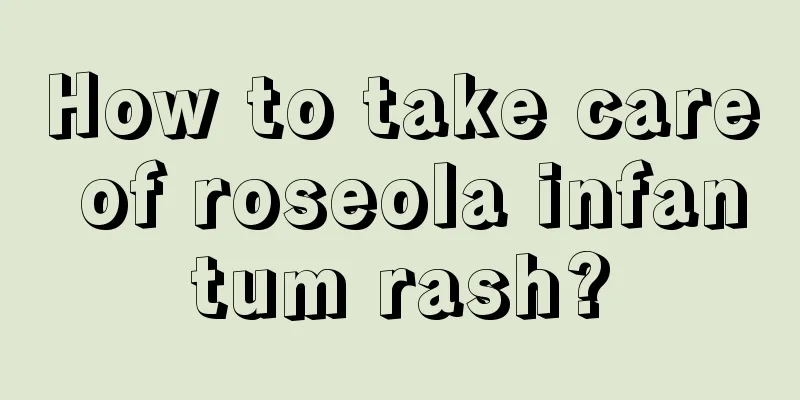What are the preventive measures for chickenpox?

|
Varicella is a relatively common acute infectious disease with a very strong contagiousness. This disease mainly occurs in infants and young children. The more typical symptoms are systemic red maculopapular rashes, herpes, scabs, etc. The incidence of varicella is very high, and parents are very concerned about the prevention measures of varicella. So, what are the preventive measures for chickenpox? Let’s take a closer look below. 1. Varicella vaccine injection: Doctors generally recommend varicella vaccine injection for infants and children over 1 year old. The disadvantages of this vaccine are that it may cause some side effects, and 10%-30% of children cannot be fully immunized. However, even if children who have been vaccinated with chickenpox are infected with chickenpox, the symptoms are very mild, and some may not even develop a rash. So if your health condition allows, you should get the chickenpox vaccine. 2. Prevention in daily life: (1) Help children develop good hygiene habits and wash their hands frequently to avoid cross-infection of infectious diseases. (2) School classrooms should frequently open windows for ventilation and keep the indoor environment clean. (3) During an epidemic, healthy children should avoid going to public entertainment venues or visiting the homes of sick children to prevent contact transmission. 3. Stay away from sources of infection: If schools or kindergartens find that a child has symptoms of chickenpox, they should immediately notify parents to take the child home to rest and take isolation measures. Vaccinate susceptible people and observe susceptible people who have been in contact with patients for 3 weeks. Children who have had contact with sick children can take Isatis root granules, one packet a day for 3-5 days, which has a certain preventive effect. (1) To prevent the spread of chickenpox, children with the disease should be isolated until the rash has completely crusted over. Children who have had contact with chickenpox patients should also be isolated and observed for three weeks. Weak children can be injected with immunoglobulin within four days of contact. During the epidemic, try to avoid taking your children to public places. (2) It is an acute respiratory infectious disease caused mainly by the varicella virus, which is more common in children aged 2 to 6 years old and occasionally in adults and infants. It is mainly transmitted through the respiratory tract via airborne droplets. It can also be transmitted through clothing, utensils, and toys due to contact with the blister fluid in the child's herpes. It is highly contagious. The disease can occur throughout the year, but is more common in winter and spring. (3) As long as there is no secondary serious bacterial infection, the prognosis of common varicella is good, and no scars will be left locally after healing. However, the mortality rate can be as high as 5% to 25% in patients with varicella who have a weakened immune system and develop severe bacterial infections, neonatal varicella, or severe cases such as disseminated varicella pneumonia and varicella encephalitis. Survivors of varicella encephalitis may also suffer from sequelae such as mental abnormalities, mental retardation, and epileptic seizures. Since chickenpox is a very common disease and is easily contagious, parents must be aware of the preventive measures for chickenpox, strengthen the protection of their children, and get the chickenpox vaccine in time to prevent chickenpox from occurring in their children to the greatest extent possible. And once the child becomes ill, active treatment should be sought to avoid causing lasting harm to the child's health. |
<<: What to do if your baby has abscess on his head
>>: Reasons for high normal blood pressure in children
Recommend
What are the symptoms of bacterial diarrhea in babies?
Diarrhea is a very painful thing for us, not to m...
Can Kawasaki disease be cured?
When a baby suffers from Kawasaki disease, there ...
What should I do if my child has indigestion and vomiting? These methods are very effective
Indigestion in children is actually very bad. Chi...
What to do if your child always loses temper?
At present, most Chinese families have only one c...
Why do babies have hemangiomas?
In our lives, many babies have hemangiomas when t...
What are the treatments for picky eating in children?
Children's picky eating has attracted the att...
How many days does it take for a child to recover from chickenpox?
Parents are most anxious when their children get ...
My baby doesn't cough during the day but coughs when sleeping at night. Why?
The baby is the expectation of the whole family. ...
Why do babies' hands and feet twitch when they fall asleep?
For infants and young children, the body's im...
Will children get hurt if they stretch their legs?
In modern society, parents always hope that their...
What are the symptoms of childhood spasms?
Infantile spasms is a relatively common disease. ...
What are the symptoms of babies not adapting to the new environment?
The improvement of people's living standards ...
How to treat watery stool in children
Sometimes children will have diarrhea if they acc...
Can a one-month-old baby go out?
Of course, babies who have just turned one month ...
What should I do if my child has diarrhea and fever? These steps can improve
If a child has diarrhea and fever, it is mostly c...









